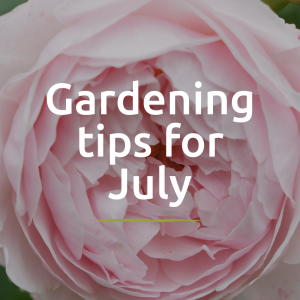Gardening Jobs for July
A bit of a mixed bag!
Wow, where did June go? We’ve been so busy in the garden we haven’t had much time to enjoy all its glory, but we’re going to make a real effort in July to relax and take in the sounds and fragrances of the garden.
June was a very warm month with its fair share of rain. July has been a mixed bag so far, warmer than June but with as much rain in the space of two weeks.
Whilst the rain is welcome and the plants have had a good soaking, the thunderstorms have caused flooding in some areas and battered tender shoots that may still be coming through so time has been spent getting the garden back in shape.
June was a month to sow, sow, sow and whilst we continue to sow, it is also time to feed, feed, feed to ensure the plants and crops grow in abundance.
Pests:
• The rain will have not only washed away the nutrients from the ground, but also reduce the effectiveness of any organic barrier spray you may have applied to protect against bugs and disease. Re-apply a barrier spray such as Plant Guard to bolster your plants protection.
• Slugs love nothing more than damp weather. Protect vulnerable plants with Slug Gone, a natural, organic deterrent. Simply scatter around the base of the plant, making sure you leave no gaps and ensure no leaves overhang the outermost area that need covering Alternatively, if you have plants in pots, try Copper Slug Tape for added protection.
• Check roses for Black Spot and Powdery Mildew. If your roses have Black Spot, pinch out the leaves and stems but do not compost. Regular feeding with a tonic such as Rose Guard will help protect against disease in the future and encourage bigger, brighter blooms.
Feed, feed, feed
• Don’t undo all of the hard work spent growing crops and flowers by forgetting to feed them on a regular basis. There are multitude of feeds to use, including those with nutrients for specific plants:
All crops and flowers: Organic All Purpose Plant Food, Vitax Q4 or Liquid Growmore.
Stressed plants: Organic Seaweed.
Tomatoes: Organic Tomato Food.
Strawberries: Organic Liquid Strawberry Fertiliser.
Roses: Organic Liquid Rose Food.
Establishing roots when planting out: Q4 Rootmore Soluble.
• Now is also the time to think about crop rotation. As some fruit and vegetables need to be replaced with autumn plants, think about adding a compost or soil conditioner such as 6X to prepare the soil for new seeds.
• If your buxus is looking a little jaded, hoe in Buxus Feed around the base and water in. This will provide vital nutrients and help green up leaf colour.
• Don’t forget your houseplants! As we spend time outside, we forget about our lovely inside plants. Houseplants are susceptible to magnesium deficiency and if you’ve noticed yellowing between the veins of older leaves, this may be the case. Add some Epsom Salts by diluting in water and applying as a liquid feed. For hungry houseplants, feed with a general feed which contains seaweed such as House Plant Feed.
• Where possible, feed outdoor flowers and crops at dusk to help retain moisture.
Keep the garden ticking over
• Harvest fruit and veg such as beetroot, beans, carrots and strawberries. Don’t leave runner beans too long or they go stringy.
• Re-pot any plants that have outgrown their existing pots, especially in the greenhouse.
• To encourage strong growth and an abundance of tomatoes, pinch out side shoots on a weekly basis and feed.
• If you’ve took your eye off your herb garden and it looks a bit wild, pick, dry and then freeze herbs before they go past their best.
• Sow small batches of fast-growing salad leaves.
• Prune early flowering shrubs such as wisteria.
• Dead head all faded flowers and keep hanging baskets and borders tidy with regular maintenance.
• Thin out fruit trees to produce a good-sized crop.
Greenhouse and lawn care
• Open the door and vents of the greenhouse to encourage good ventilation.
• If you haven’t already, use a shading such as Summer House Greenhouse Shading or blinds to prevent overheating.
• Prolonged warm weather can cause stress and scorch to lawns, so if you are going to mow, set it at a higher level or don’t mow at all to encourage insects into the garden.
The summer months are a great time to start a diary to include what has worked well and what hasn’t. Maybe take a well-earned rest and browse through those autumn bulb catalogues to start preparing and planting for the cooler months.
Your login details have been used by another user or machine. Login details can only be used once at any one time so you have therefore automatically been logged out. Please contact your sites administrator if you believe this other user or machine has unauthorised access.














